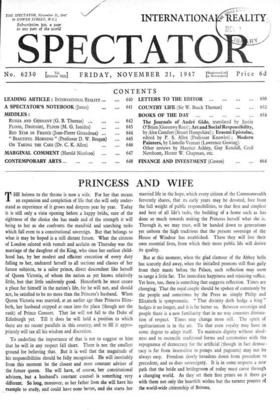PRINCESS AND WIFE
THE heiress to the throne is now a wife. For her that means an expansion and completion of life that she will only under- stand as experience of it grows and deepens year by year. Today it is still only a vista opening before a happy bride, sure of the rightness of the choice she has made and of the strength it will bring to her as she confronts the manifold and searching tasks which fall even to a constitutional sovereign. But that belongs to what it may be hoped is a still distant future. What the citizens of London saluted with tumult and acclaim on Thursday was the marriage of the daughter of the King, who since her earliest child- hood has, by her modest and efficient execution of every duty falling to her, endeared herself to all sections and classes of her future subjects, to a sailor prince, direct descendant like herself of Queen Victoria, of whom the nation as yet knows relatively little, but that little uniformly good. Henceforth he must create a place for himself in the nation's life, for he will not, and should not, be satisfied to be no more than the Princess's husband. When Queen Victoria was married, at an earlier age than Princess Eliza- beth, her husband stepped at once into the place (though not the rank) of Prince Consort. That lot will not fall to the Duke of Edinburgh yet. Till it does he will hold a. position to which there are no recent parallels in this country, and to fill it appro- priately will tax all his wisdom and discretion.
To underline the importance of that is not to suggest or hint that he will in any respect fall short. There is not the smallest ground for believing that. But it is well that the magnitude of his responsibilities should be fully recognised. He will inevitably from this moment be the closest and most constant adviser of the future queen. She will have, of course, her constitutional advisers, but a husband's constant counsel is something very different. So long, moreover, as her father lives she will have his example to study, and could have none better, and she starts her married life in the hope, which every citizen of the Commonwealth fervently shares, that its early years may be devoted, free from the full weight of public responsibilities, to that first and simplest and best of all life's tasks, the building of a home such as has done so much towards making the Princess herself what she is. Through it, we may trust, will be handed down to generations yet unborn the high traditions that the present sovereign of the House of Windsor has established. There they will live their own essential lives, from which their more public life will derive its quality.
But at this moment, when the glad clamour of the Abbey bells has scarcely died away, when the initialled pennons still float gaily from their masts before the Palace, such reflection may seem to range a little far. The immediate happiness and rejoicing suffice. Yet here, too, there is something that suggests reflection. Times are changing. That the royal couple should be spoken of commonly by the people and sometimes by the Press as simply Philip and Elizabeth is symptomatic. " That divinity doth hedge a king " hedges it no longer, and it is far better so. Between sovereign and people there is a new familiarity that in no way connotes diminu- tion of respect. Times may change more still. The spirit of egalitarianism is in the air. To that even royalty may have in some degree to adapt itself. To maintain dignity without aloof- ness and to reconcile traditional forms and ceremonies with the repugnance of democracy for the artificial (though in fact democ- racy is far from insensitive to pomps and pageants) may not be always easy. Freedom slowly broadens down from precedent to precedent, and so does sovereignty. It is in some respects a new path that the bride and bridegroom of today must carve through a changing world. As they set their first prints on it there go with them not only the heartfelt wishes but the earnest prayers o( the world-wide citizenship of Britons.


































